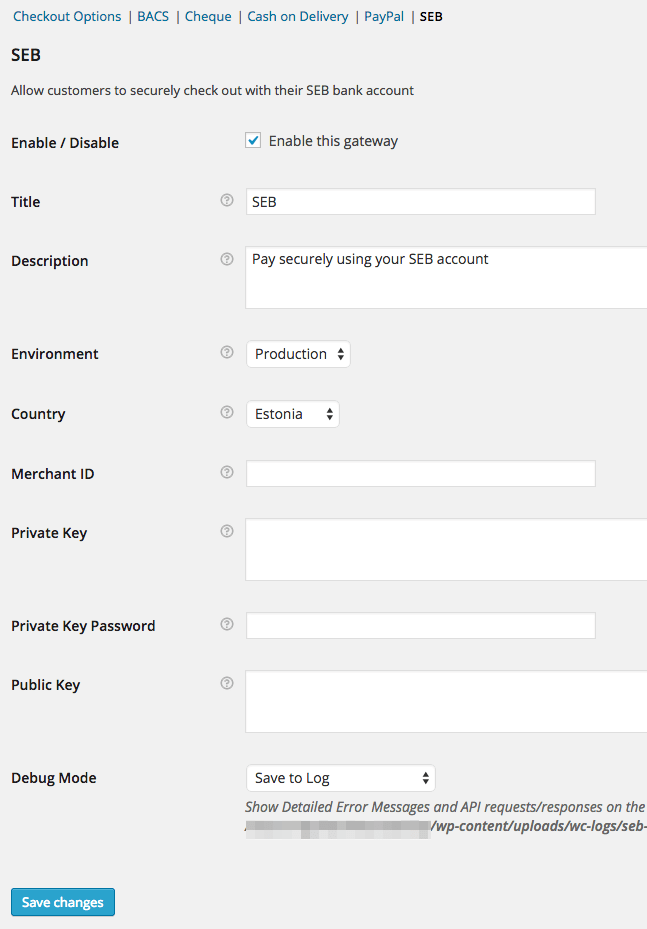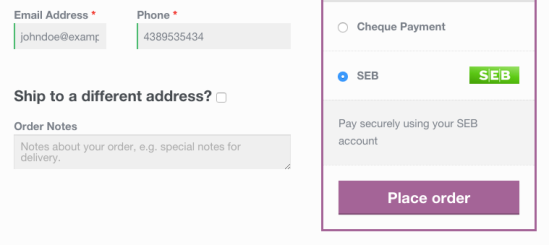WooCommerce SEB Gateway allows your customers to securely check out using their SEB account.
Note: This product has been retired and is not for sale. Documentation is no longer being updated.
Requirements
↑ Back to top- Euro must be set as the store currency
- An SEB account
Installation
↑ Back to top- Download the .zip file from your WooCommerce account.
- Go to: WordPress Admin > Plugins > Add New and Upload Plugin with the file you downloaded with Choose File.
- Install Now and Activate the extension.
Setup and Configuration
↑ Back to topSEB credentials
↑ Back to topopenssl genrsa -out private_key.pem 2048 openssl req -sha1 -new -key private_key.pem -out csr.pemYou are asked for a series of data for the certificate:
- Country [AU]: 2-letter country code. One of EE, LV, LT. Example: EE
- State or Province Name (full name) [Some-State]: your company state/province. Example: Harju maakond
- Locality Name (eg, city) []: your company city/town/village. Example: Tallinn
- Organization Name (eg, company) [Internet Widgits Pty Ltd]: Example: Nööbid & Kindad AS
- Organizational Unit Name (eg, section) []: Can be left empty, but you can also enter “banklink” (without the quotes)
- Common Name (e.g. server FQDN or YOUR name) []: the domain name of your store. Example: www.mysuperawesomestore.com
- Email Address []: merchant’s (your) email address. Example: johndoe@example.com
- A challenge password []: leave blank (press Enter)
- An optional company name []: leave blank (press Enter)
Protect your private key! Under no circumstances should you send or share with anyone. This is something that only you should have access to.
If you are having trouble using Terminal/Shell/Command Line, try generating the private key and CSR online. Note that this is not the recommended method to use – do this only at your own risk!
Extension settings
↑ Back to top
- Enable / Disable – Enable the gateway if you are ready to go live.
- Title – Displayed to customers during checkout and on the Order Received page.
- Description – Displayed under the title during checkout. Limited HTML is allowed.
- Environment – Switch between “Test” and “Production” credentials. Enable “Test” to send transactions to the bank link test service.
- Merchant ID – Sent to you by SEB. For Test mode, this is the Merchant ID for your bank link test service. Follow the steps below to get this.
- Private Key – Private key you generated for SEB. For Test mode, this is the private key generated by your bank link test service. Follow the steps below to get this.
- Private Key Password – Private key password if you used one (Production or Test).
- Public Key – Public key / certificate for SEB in your country. SEB will provide it to you after signing a contract. For Test mode, this is the public key for your bank link test service. Follow the steps below to get this.
- Debug Mode – Enable if you are having issues correctly processing transactions. You can either log API requests / responses directly to the checkout / thank you page, save them to the WooCommerce Error Log (found under WooCommerce > System Status > Logs) or both. All debugging messages are cleaned of sensitive information before display, but as a best practice, do not enable unless you are having issues with the plugin.
Test Mode
↑ Back to top- Click SEB Estonia Test
- Click Certificates
- Copy the following to the gateway settings and save:
- Copy Merchant ID to Test Merchant ID field.
- Copy Merchant’s private key to Test Private Key field.
- Copy Bank’s certificate to Test Public Key field.
All test payments are publicly visible to everyone using the Banklinks service. If you need to keep your test payments (including the payment parameters and origin server) private, use the stand-alone version (Estonian only) instead.
To set up testing for SEB Lithuania, you need to create an account with Test Pay. Once logged in, generate certificates, create a “test shop” and get credentials.
- Generate a test certificate using the Test Pay Certificate Generation tool. Save the private key and certificate body in your somewhere in your computer.
- Download the SEB bank certificate from the list of certificates. This saves a file called seb.crt on your computer.
- Select My Shops in User Menu
- Select Add new store
- Enter something meaningful as the Store name, for example: SEB Lithuania Test
- Copy & paste the Store certificate that you generated in step 1 to the appropriate field.
- Copy & paste the Store private key (without password) that you generated in step 1 to the appropriate field.
- Copy & paste the Bank certificate that you downloaded in step 2. You can open the seb.crt file with a text editor, such as Notepad (Windows) or TextEdit (Mac OS) and simply copy it’s contents to the appropriate field.
- Select “SEB” bankas as the payment gateway
- Save – you should now be presented with Shop testing data
- Copy the following to WooCommerce SEB Gateway settings and save:
- Copy VK_SND_ID to Test Merchant ID field.
- Enter any name to the Test Recipient Name
- Enter any IBAN account number to Test Recipient Account
- Copy Private Key (without password), that you generated in step 1 to Test Private Key field.
- Copy Bank’s certificate, that you downloaded in step 2 to Test Public Key field.
Usage
↑ Back to top
Troubleshooting
↑ Back to top- Check that your Merchant ID, Private Key and Public Key are correct.
- Double-check that your Merchant ID, Private Key and Public Key are correct.
- Enable only WooCommerce and SEB using a WordPress default theme to see if the issue persists.
- Submit a support ticket and tell us what happened when you took these steps.
FAQ
↑ Back to topWooCommerce 2.2 added the ability to process automatic refunds. Does this gateway support automatic refunds?
↑ Back to topWhere can I find official SEB bank link documentation?
↑ Back to top- Estonia: English | Estonian | Russian
- Lithuania: English | Lithuanian
